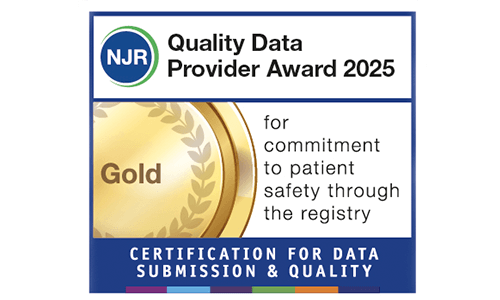Abdominal pain can have many causes - some minor, others more serious. It may come from your stomach or other organs like the gallbladder, liver, or kidneys. Common triggers include indigestion, infection, or gallstones.
If pain is severe, persistent, or unexplained, you should seek medical care.
What is abdominal pain?
Abdominal pain is discomfort anywhere between your ribs and pelvis. It’s often called a “stomach ache,” but the pain may come from other organs like your liver, gallbladder, pancreas, or intestines.
Abdominal aches and pains can feel sharp, dull, crampy, or constant - and they may come from your digestive system, muscles, or nearby areas like your chest or back.
How common is abdominal pain?
Abdominal pain is very common in the UK - most people will experience it at some point. Often, it’s mild and resolves on its own, especially if caused by indigestion, trapped wind, or a stomach bug.
However, it can also be a sign of a more serious condition or even an emergency. If you have pain that is severe, persistent, or unexplained, it’s important to seek medical advice.
Types of abdominal pain
Abdominal pain can feel different depending on what’s causing it and where it’s located. Doctors often ask where the pain is and what it feels like to help find the cause.
By location
-
Upper abdomen - above your belly button. It may involve your stomach, liver, or gallbladder.
-
Lower abdomen - below your belly button. Painful lower abdominal cramps and other lower abdomen pains are often linked to your intestines, bladder, or reproductive organs.
-
Right or left side - pain on one side may point to specific organs like your appendix (right) or colon (left).
By type
-
Generalised pain - felt across most of your stomach, often due to gas, indigestion, or a stomach bug.
-
Localised pain - in one spot, it could signal a problem with an organ like your appendix or gallbladder.
-
Cramp-like pain - usually mild and linked to bloating or diarrhoea.
-
Colicky pain - comes in waves and can be severe, it is common with kidney or gallstones.
Causes of abdominal pain
Most abdominal pain is mild and short-lived. Common abdominal pain causes include:
Digestive issues
Abdominal pain after eating can include:
-
Indigestion, gas, constipation, diarrhoea
-
Food poisoning or intolerances (like lactose)
-
IBS (irritable bowel syndrome)
Infections and inflammation
Reproductive causes
Female abdominal pain can be related to reproductive reasons:
Other medical conditions
-
Appendicitis
-
Gallstones – link to new page once created
-
Kidney stones
-
Hernias or bowel blockage
-
Pancreatitis or abdominal aneurysm.
Serious causes of abdominal pain
Sometimes abdominal pain signals a serious condition that needs medical attention. Where the pain is felt can help point to its cause.
Upper right abdomen
Includes your liver, gallbladder, and right kidney.
Possible causes of upper right abdominal pain are gallstones, liver disease, kidney infection.
Upper left abdomen
Includes your stomach, pancreas, spleen, and left kidney.
Possible causes of upper left abdominal pain are pancreatitis, stomach ulcer, kidney stones, heart or lung issues.
Lower abdomen
Includes your intestines, bladder, and reproductive organs.
Possible causes of lower abdominal pain are appendicitis (right side), diverticulitis (left side), bowel obstruction, endometriosis, ovarian cysts, ectopic pregnancy, abdominal aneurysm.
If pain is sudden, severe, or persistent, seek medical advice or call 999.
How to relieve abdominal pain
We now know that treatment depends on the cause. Some conditions like appendicitis or gallstones may need surgery, while others can be managed at home or with medication.
Home remedies (for mild or digestive-related pain)
-
Bowel rest - stick to bland foods like bananas, rice, or toast
-
Hydration - drink water or oral rehydration fluids, especially if you have diarrhoea
-
Heat therapy - use a hot water bottle or take a warm bath
-
Ginger or peppermint - can help with nausea, bloating, or cramps
-
Chamomile tea - may ease inflammation and relax the digestive system
-
Probiotics - found in yoghurt or supplements, may help with gut health.
Medical treatment
-
Pain relief - paracetamol or antispasmodics (avoid NSAIDs unless advised)
-
Antibiotics - for infections like UTIs or diverticulitis
-
Acid reducers - for ulcers or reflux
- Surgery - may be needed for appendicitis, gallstones, or bowel obstruction.
When to call your doctor: How to tell if abdominal pain is serious
Most abdominal pain isn’t serious, but some symptoms can signal a medical emergency.
Seek help immediately if you experience:
-
Sudden, sharp or worsening pain
-
Pain with fever, vomiting, or blood in stool or urine
-
A rigid or swollen abdomen
-
Yellowing of the skin or eyes (jaundice)
-
Chest, shoulder, or back pain with nausea
-
Difficulty breathing
-
Pain after injury or if you’re pregnant.
Contact your GP if you have:
-
Pain lasting more than 48 hours
-
Persistent bloating or diarrhoea
-
Burning when you urinate
-
Unexplained weight loss or poor appetite.
If in doubt, call NHS 111 or visit your nearest A&E.
How is the cause of abdominal pain diagnosed?
To find out what’s causing your abdominal pain, your doctor will start with a physical exam and ask detailed questions about your symptoms and medical history.
Questions you may be asked
-
Where is the pain located? Is it sharp, dull, or crampy?
-
Does it come and go, or is it constant?
-
Does it get worse after eating, moving, or lying down?
-
Have you had similar pain before?
-
Are you pregnant or taking any medications?
-
Do you have other symptoms like fever, vomiting, or changes in bowel habits?
Tests that may be done
-
Blood, urine, or stool tests to check for infection or inflammation
-
Ultrasound or CT scan to view organs and detect gallstones, appendicitis, or kidney stones
-
Endoscopy or colonoscopy to examine the digestive tract
-
X-rays or ECG if heart or chest-related causes are suspected.
Your doctor will use this information to decide whether your pain is minor or needs urgent treatment.
Abdominal pain management at Ramsay Health Care
Ramsay Health Care UK offers expert, patient-centred care for abdominal pain, whether acute or chronic. Our pain medicine consultants specialise in diagnosing and treating complex pain conditions using advanced imaging, minimally invasive procedures, and tailored rehabilitation plans.
Why Choose Ramsay?
-
Access to leading pain specialists and consultants
-
Comprehensive diagnostic services including ultrasound, CT, and endoscopy
-
Personalised treatment plans focused on long-term relief and recovery
-
Comfortable, private hospital settings with fast access to treatment
Take control of your pain with expert care from Ramsay Health Care.
Contact our friendly team to discuss further or to book an appointment today.


